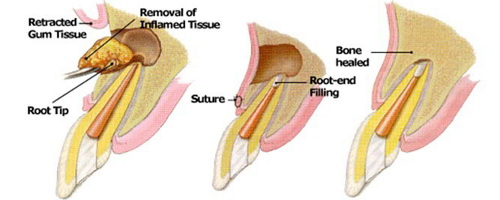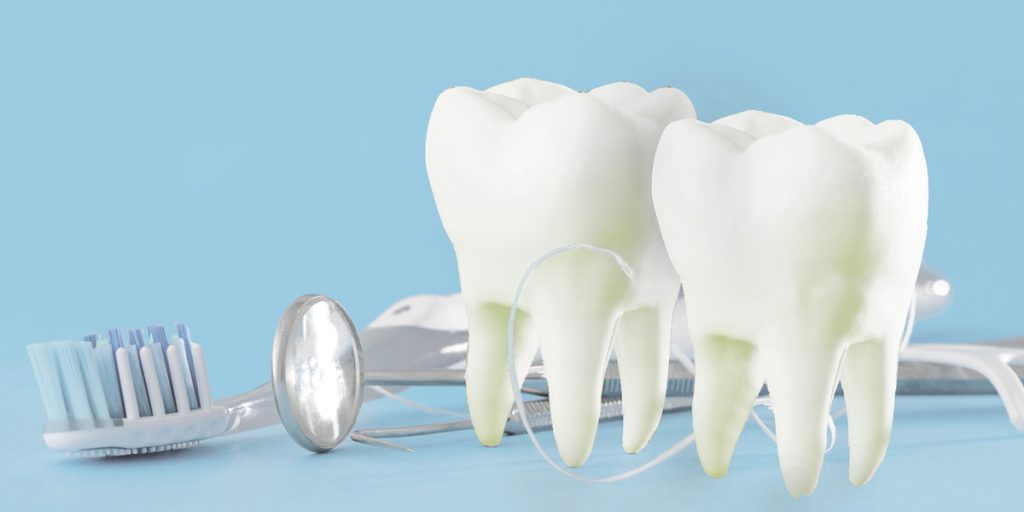Oral care is one of the areas of personal care that is extremely important and continuous. If this care is not provided adequately, cavities occur in the teeth. The bad bacteria in these caries can affect the tooth root after a certain period of time. The inflammation of the tooth root that occurs as a result of this effect has the power to negatively affect the life of the person. Root canal treatment is applied to relieve this discomfort. However, in some cases, this root canal treatment is insufficient. At this stage, a surgical procedure called Apical Resection comes into play. So, what is Apical Resection and how it is treated will be answered in our article.
- What Is Apical Resection?
- How Is Apical Resection Diagnosed?
- What Are The Advantages Of Apical Resection?
- What Are The Disadvantages Of Apical Resection?
- How Is Apical Resection Surgery Performed?
- In Which Situations I Apical Resection Not Performed?
- Can Apical Resection Be Applied To All The Teeth?
- In Which Situations Is Apical Resection Surgery Applied?
- Hemisection vs. Bicuspidization: What’s the Difference?
- Can Apical Resection Surgery Be Applied to All Teeth?
- What Should Be Considered After Apical Resection?
- What Is The Apical Resection Success Rate?
- How Is Apical Resection Treatment?
- What Is The Difference Between Apicoectomy and Resection?
- What Is The Apical Resection Procedure?
- What Is The Apical Of The Tooth?
- Should Tooth Extraction Instead of Apical Resection Treatment?
- Pain After Apical Resection
- How Long Does Swelling Last After Apical Resection?
- Apical Resection Treatment Prices in Turkey
- Apical Resection Treatment
- Apical Resection Surgery
What Is Apical Resection?

Apical resection is the process of cleaning and removing the inflamed structure that occurs at the root tips of the tooth by surgical method. In short, the answer to the question of What is Apical Resection is like this.
In cases where dental care is insufficient, bacteria can grow in the mouth and cause tooth decay. After these bruises progress and reach the roots, this problem can be solved with root canal treatment. Although root canal treatments are applied to many patients and have positive results, they may not work in many patients. At this stage, the root tips should be cleaned from inflammation and infections by surgical operation. This is also called Apical Resection.
How Is Apical Resection Diagnosed?
- Medical history and physical examination: Your dentist will ask you about your medical history and symptoms, and perform a physical examination of your teeth and gums.
- X-rays: X-rays can help to show the extent of the infection and the location of the root tip.
- Cone beam computed tomography (CBCT): CBCT is a type of 3D X-ray that can provide more detailed images of the root tip and surrounding tissues.
- Root canal treatment: If the infection is limited to the root canal, your dentist may be able to treat it with root canal treatment. However, if the infection has spread to the root tip, apical resection may be necessary.
If your dentist diagnoses you with an apical infection, they will discuss the treatment options with you, including apical resection. They will also explain the risks and benefits of each option so that you can make an informed decision about your care.
Here are some of the symptoms of apical infection that may require apical resection:
- Pain: The pain may be constant or intermittent, and it may be worse at night or when you bite down.
- Swelling: There may be swelling around the affected tooth.
- Gum recession: The gums may recede around the affected tooth.
- Foul taste or smell: You may experience a foul taste or smell in your mouth.
- Discharge: There may be a discharge from the gums around the affected tooth.
What Are The Advantages Of Apical Resection?

Apical resection is a surgical procedure that is used to remove the infected or damaged tip of a tooth root. It is a less invasive procedure than tooth extraction, and it can sometimes save the tooth.
Here are some of the advantages of apical resection:
- It can save the tooth. In some cases, apical resection can be a successful way to cure an infection and save the tooth. This is especially true if the infection is not too severe and the tooth is in good condition.
- It is less invasive than tooth extraction. Apical resection is a less invasive procedure than tooth extraction. This means that there is less tissue damage and a shorter recovery time.
- It can preserve the natural tooth structure. Apical resection preserves more of the natural tooth structure than tooth extraction. This can be important for maintaining the strength and function of the tooth.
- It is a reversible procedure. Apical resection is a reversible procedure. This means that if the infection recurs, the tooth can be extracted without affecting the surrounding teeth and gums.
What Are The Disadvantages Of Apical Resection?
Apical resection is a surgical procedure that is used to remove the infected or damaged tip of a tooth root. It is a less invasive procedure than tooth extraction, but it does have some disadvantages.
Here are some of the disadvantages of apical resection:
- It is not always successful in curing the infection. In some cases, the infection may recur after apical resection. This is more likely to happen if the infection is severe or if the tooth is not in good condition.
- There is a risk of damage to the surrounding teeth and gums. The dentist must be careful not to damage the surrounding teeth and gums during apical resection. However, there is always a risk of damage, especially if the infection is severe.
- There is a risk of nerve damage. The nerves that supply the teeth and gums are located near the root tips. There is a small risk of nerve damage during apical resection.
- The recovery time is longer than for a simple extraction. The recovery time for apical resection is usually about two weeks. This is longer than the recovery time for a simple extraction.
How Is Apical Resection Surgery Performed?

Apical resection, that is, root tip treatment, is performed with the effect of local anesthesia. In this way, the patient does not feel uncomfortable or pain during the surgery. It takes about 30 minutes on average. After cleaning the infection in the root of the tooth, the area is closed by suturing. Root tip surgery performed in correct and experienced hands successfully passes, and after a while, the infection passes. Afterward, bone formation is expected in the region on its own. The question of How Apical Resection Surgery is Performed can be answered in this way.
In Which Situations I Apical Resection Not Performed?
- If the infection is severe and has spread to the surrounding tissues. In this case, tooth extraction may be the only way to prevent the infection from spreading further.
- If the tooth is severely damaged and cannot be saved. In this case, tooth extraction is the only option.
- If the patient has a compromised immune system. In this case, apical resection may be more risky due to the increased risk of infection.
- If the patient is not a good candidate for surgery. This could be due to other medical conditions or due to the patient’s overall health.
Ultimately, the decision of whether or not to perform apical resection is made on a case-by-case basis. Your dentist will consider all of the factors involved in your case, including the severity of the infection, the location of the tooth, and your overall health, to make the best decision for you.
Here are some other factors that may affect the decision of whether or not to perform apical resection:
- The patient’s age: Younger patients are more likely to be good candidates for apical resection, as their tissues are more likely to heal well.
- The patient’s desire to keep the tooth: Some patients may prefer to have the tooth extracted, even if apical resection is a possibility.
- The cost of apical resection: Apical resection can be a more expensive procedure than tooth extraction.
Can Apical Resection Be Applied To All The Teeth?

Yes, apical resection can be applied to all the teeth, including molars. However, there are some factors that may make apical resection more difficult or less successful in certain teeth. These factors include:
- The location of the tooth. Teeth that are located in the back of the mouth may be more difficult to access, which can make apical resection more challenging.
- The number of roots. Teeth with multiple roots may require more complex apical resection procedures.
- The severity of the infection. If the infection is severe, it may be more difficult to cure with apical resection.
- The patient’s overall health. Patients with certain medical conditions, such as diabetes or heart disease, may be at a higher risk of complications from apical resection.
In Which Situations Is Apical Resection Surgery Applied?
In which cases Apical Resection Surgery is Applied, we can explain as follows:
- In cyst formations occurring in tooth roots
- When root canal treatment fails
- In cases where an instrument is broken during root canal treatment and this part needs to be removed from there
- If at least one-third of the root bone is broken
Hemisection vs. Bicuspidization: What’s the Difference?
Hemisection and bicuspidization are two surgical procedures that can be used to treat periodontally compromised multi-rooted teeth. Both procedures involve dividing the tooth into two or more parts, but there are some key differences between the two.
Hemisection
In hemisection, the tooth is divided in half along the midline, with one root and half of the crown removed. The remaining root and crown are then restored with a crown or bridge. Hemisection is typically used to treat teeth with two roots that have severe periodontal disease on one side.
Bicuspidization
In bicuspidization, the tooth is divided into three parts, with the middle root and crown removed. The two remaining roots are then restored with crowns or bridges. Bicuspidization is typically used to treat teeth with three roots that have severe periodontal disease on one or two sides.
Advantages and Disadvantages
Hemisection and bicuspidization have both advantages and disadvantages. Hemisection is a less invasive procedure than bicuspidization, and it typically has a shorter recovery time. However, hemisection can sometimes lead to problems with the remaining root, such as root fracture or recurrent periodontal disease.
Bicuspidization is a more invasive procedure than hemisection, but it is also more likely to preserve the long-term health of the tooth. Bicuspidization is also less likely to lead to problems with the remaining roots.
Which Procedure is Right for You?
The best procedure for you will depend on the specific circumstances of your case. Your dentist will consider the severity of your periodontal disease, the number of roots in the tooth, and your overall oral health when making a recommendation.
If you are considering hemisection or bicuspidization, it is important to talk to your dentist about the risks and benefits of each procedure. They can help you decide which procedure is right for you and your smile.
Here are some additional things to keep in mind about hemisection and bicuspidization:
- Both procedures are typically performed under local anesthesia.
- The recovery time for both procedures is usually about two weeks.
- There is a risk of infection after either procedure.
- Both procedures can lead to tooth sensitivity.
Can Apical Resection Surgery Be Applied to All Teeth?

The question of whether Apical Resection Surgery can be applied to all teeth can be answered as follows. If the patient’s mouth and jaw structure is suitable and the doctor deems it necessary, this surgery can be applied to any tooth.
What Should Be Considered After Apical Resection?
What Should Be Considered After Apical Resection?
- After the operation, the dental buffer should not be removed immediately. In this way, unnecessary bleeding is prevented.
- You should not eat or drink anything for at least 2 hours after the surgery.
- When it is time to eat or drink after the surgery, care should be taken to ensure that the foods or beverages consumed are warm.
- Avoid hot food and drinks.
- Hard foods and drinks should be avoided.
- In order to consume solid foods, it is necessary to wait for the anesthetic effect to pass completely.
- If swelling occurs, ice can be applied.
- The ice method applied must be external. It can be done for one day and should be applied ten minutes apart.
- After the operation, the pain that occurs after the anesthetic effect wears off can be controlled with the drugs given by the doctor.
- Oral care should be taken care of.
- It is important to keep the operated area clean.
What Is The Apical Resection Success Rate?
When asked what is the Apical Resection Success Rate, the recovery rate is quite high after root canal treatment, which cannot be performed and is not sufficient.
How Is Apical Resection Treatment?
“Apical resection treatment” refers to a dental procedure that is often performed to treat infections or abscesses at the root tip of a tooth. This procedure is typically recommended when a root canal treatment fails to completely eliminate the infection or if the infection recurs.
During an apical resection treatment, the dentist or endodontist removes the infected tissue at the root tip, along with a small portion of the surrounding bone. This is done to ensure the complete removal of the infection and to prevent its further spread. Once the infected tissue is removed, the area is thoroughly cleaned and disinfected.
After the apical resection treatment, the dentist may place a small filling material at the root tip to seal the area and prevent reinfection. In some cases, a small bone graft may be placed to promote the regeneration of the bone that was removed during the procedure.
The success rate of apical resection treatment is generally high, with most patients experiencing relief from pain and resolution of the infection. However, it is important for patients to follow proper oral hygiene practices and attend regular dental check-ups to maintain the health of the treated tooth and prevent future infections.
In conclusion, “apical resection treatment” is a dental procedure that is performed to treat infections or abscesses at the root tip of a tooth. It is an effective treatment option that can help alleviate pain and restore oral health.
What Is The Difference Between Apicoectomy and Resection?

When it comes to dental procedures, there are various terms that may sound unfamiliar, such as apicoectomy and resection. Understanding the difference between these two procedures is crucial for anyone seeking dental treatment.
Apicoectomy, also known as root-end surgery, is a surgical procedure performed on the root tip (apex) of a tooth. It is usually recommended when a root canal treatment fails or when the infection persists after the initial treatment. During an apicoectomy, the dentist or endodontist removes the infected tissue and the tip of the root and then seals the end of the root to prevent further infection. This procedure is often performed under local anesthesia and requires a small incision in the gum tissue near the tooth.
On the other hand, resection, also referred to as hemisection or bicuspidization, involves the removal of a portion of a tooth. This procedure is typically done when a tooth is severely damaged or decayed and cannot be restored through other means. The dentist will carefully remove the affected part of the tooth, including the root if necessary, and then shape and restore the remaining portion. Resection is usually performed under local anesthesia, and the extent of the procedure depends on the severity of the tooth damage.
In summary, the main difference between apicoectomy and resection lies in the specific area of the tooth that is treated. Apicoectomy focuses on the root tip, while resection involves the removal of a portion of the tooth itself. Both procedures are performed to address specific dental issues and restore oral health, but the approach and extent of treatment differ. It is always best to consult with a dental professional to determine which procedure is appropriate for individual dental needs.
What Is The Apical Resection Procedure?
The apical resection procedure, also known as an apicoectomy, is a surgical dental treatment performed to save a tooth that has an infection or inflammation in the root tip. It is typically recommended when a root canal treatment has failed to completely eliminate the infection or when a tooth has a complex root structure that makes it difficult to treat with conventional root canal therapy.
During an apical resection, the dentist or endodontist makes a small incision in the gum to access the root of the tooth. The infected or inflamed tissue at the root tip, known as the apex, is carefully removed along with a small portion of the root. This ensures that all the infected tissue is eliminated, preventing further spread of the infection.
Once the apex is removed, the dentist cleans and seals the remaining portion of the root to prevent any future infections. In some cases, a small filling material may be placed to support the tooth structure. The gum is then sutured back into place, allowing for proper healing.
The apical resection procedure is typically performed under local anesthesia, ensuring minimal discomfort for the patient. It is a relatively quick procedure, usually completed within an hour, and patients can usually return to their normal activities shortly after.
While the apical resection procedure is effective in saving a tooth, it is important to note that it is not always the first choice of treatment. Dentists will first explore other options, such as root canal therapy, before considering an apical resection. However, in cases where these alternative treatments are not suitable, apical resection can be a valuable solution to preserve a natural tooth and maintain oral health.
What Is The Apical Of The Tooth?
The apical region of a tooth is a critical part of its anatomy, playing a vital role in its overall health and function. Located at the tip of the root, the apical area is a small opening through which blood vessels and nerves enter the tooth. It acts as a gateway, connecting the inner pulp chamber of the tooth to the surrounding tissues.
The apical region is particularly significant during the development of a tooth. As the tooth grows, nutrients and oxygen are delivered through the blood vessels in the apical area, nourishing the living tissues inside the tooth. Additionally, the nerves in this region provide sensory information, allowing us to perceive sensations like temperature and pain.
However, the apical region can also be susceptible to various dental issues. Infections, such as abscesses, can develop in this area, causing severe pain and swelling. In such cases, root canal treatment may be necessary to remove the infected tissue and restore the health of the tooth.
The apical region is also a crucial consideration during dental procedures. Dentists carefully assess the apical foramen, the opening at the apex of the tooth, before performing any root canal treatment or extraction. Accurate measurements and imaging techniques are used to ensure precise treatment and minimize the risk of complications.
In conclusion, the apical region of a tooth serves as a gateway for essential nutrients and nerves, contributing to the tooth’s growth, development, and overall health. Understanding its significance and addressing any issues that may arise in this area is essential for maintaining optimal oral health.
Should Tooth Extraction Instead of Apical Resection Treatment?
Apical resection is a surgical procedure that is used to remove the infected or damaged tip of a tooth root. It is a less invasive procedure than tooth extraction, and it can sometimes save the tooth. However, there are some cases where tooth extraction may be the better option.
When Should Tooth Extraction Be Considered?
There are a few factors that your dentist will consider when deciding whether to recommend apical resection or tooth extraction. These factors include:
- The severity of the infection or damage to the tooth root
- The location of the tooth
- The health of the surrounding teeth and gums
- Your overall health
If the infection or damage to the tooth root is severe, tooth extraction may be the only way to prevent the infection from spreading. This is especially true if the tooth is located in a difficult-to-reach area, such as the back of the mouth.
If the surrounding teeth and gums are healthy, apical resection may be a good option to save the tooth. However, if the surrounding teeth and gums are also infected or damaged, tooth extraction may be the best way to prevent further infection.
Your Overall Health
Your overall health is also a factor that your dentist will consider when making a recommendation. If you have a compromised immune system, tooth extraction may be the better option to prevent the spread of infection.
Ultimately, the decision of whether to have apical resection or tooth extraction is a personal one. Your dentist will be able to discuss the risks and benefits of each procedure with you and help you make the best decision for your individual needs.
Pain After Apical Resection
Pain after Apical Resection may begin with the anesthetic effect passing. You should not forget that you had an operation. Symptoms such as pain, swelling, and bruising as a result of this are quite normal. Pain can be controlled with medications prescribed by the doctor. However, if there are situations that do not seem normal to you, it is useful to consult your doctor.
How Long Does Swelling Last After Apical Resection?
Generally, the swelling that occurs after the surgery lasts approximately 2-3 days. Ice can be applied to this swelling from the outside. This may be the answer to the question How Long Does the Swelling Last After Apical Resection? Timely use of prescribed medications after surgery can reduce possible adverse effects.
Apical Resection Treatment Prices in Turkey
In the field of dental treatments, Turkey also saves people from their negative situations with successful methods. In this way, it is seen that the treatment methods in Turkey, whose success and satisfaction rate have increased, are preferred by foreign citizens. The reasons for this preference can be briefly explained as follows:
- Hospitals are spacious, clean, and fully equipped
- The fact that the doctors are experts in their field and smiling
- Hospitality and helpfulness of all staff who take care of patients
- The use of modern treatment methods in the treatment of diseases
- Treatment and all other needs are met at an affordable price,
It can be shown among the reasons for preference
Apical Resection Treatment Prices in Turkey are among the topics that everyone is curious about. But it is not correct to give clear information. Because the diagnosis and treatment methods are personal, this causes changes in prices. You can contact us for answers to your questions and price information. In addition, if you come to Turkey through us, we can facilitate visa procedures with the invitation letter we send to the consulate.
Apical Resection Treatment
Apical resection is a surgical procedure that is used to remove the infected or damaged tip of a tooth root. It is a less invasive procedure than tooth extraction, and it can sometimes save the tooth.
Apical Resection Surgery
The procedure is typically performed under local anesthesia. The dentist will make an incision in the gums and then remove the infected or damaged tip of the root. The dentist will then clean and disinfect the area and fill the hole with a material that will help to promote healing.
Here are the steps involved in apical resection surgery:
-The dentist will numb the area around the tooth with local anesthesia.
-The dentist will make an incision in the gums to expose the root tip.
-The dentist will use a drill to remove the infected or damaged tip of the root.
-The dentist will clean and disinfect the area.
-The dentist will fill the hole with a material that will help to promote healing.
-The dentist will stitch the incision closed.

Vimfay International Health Services